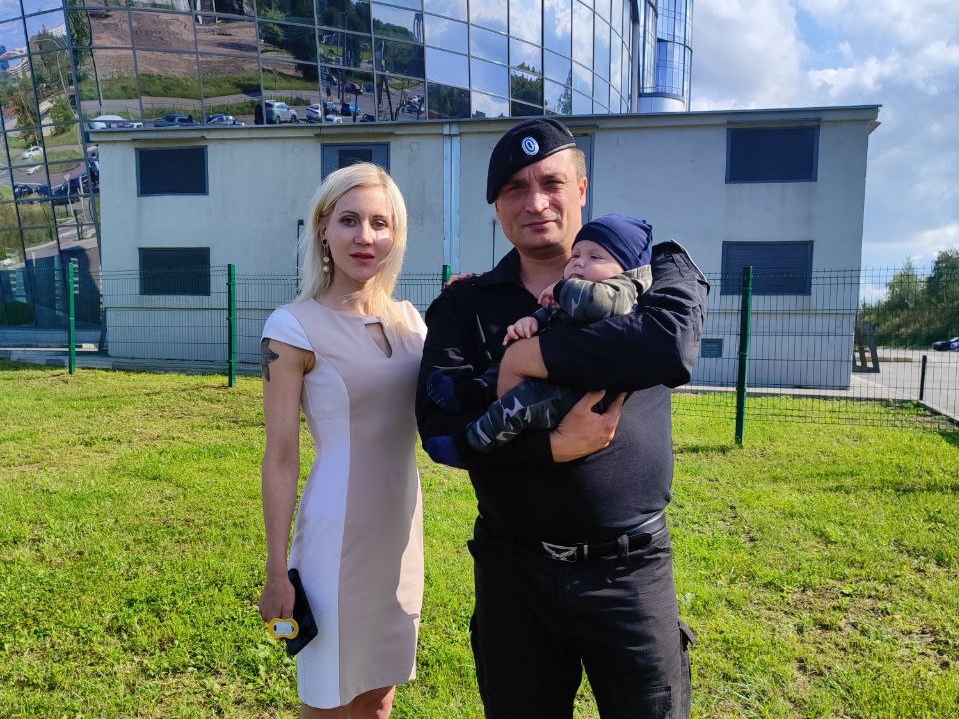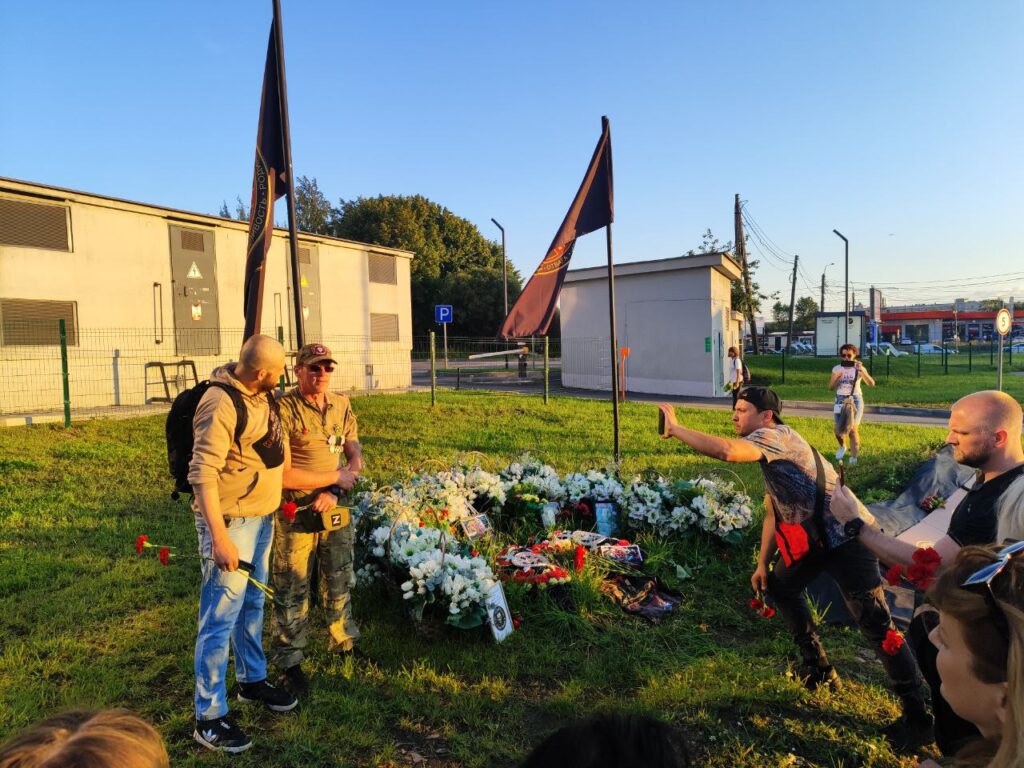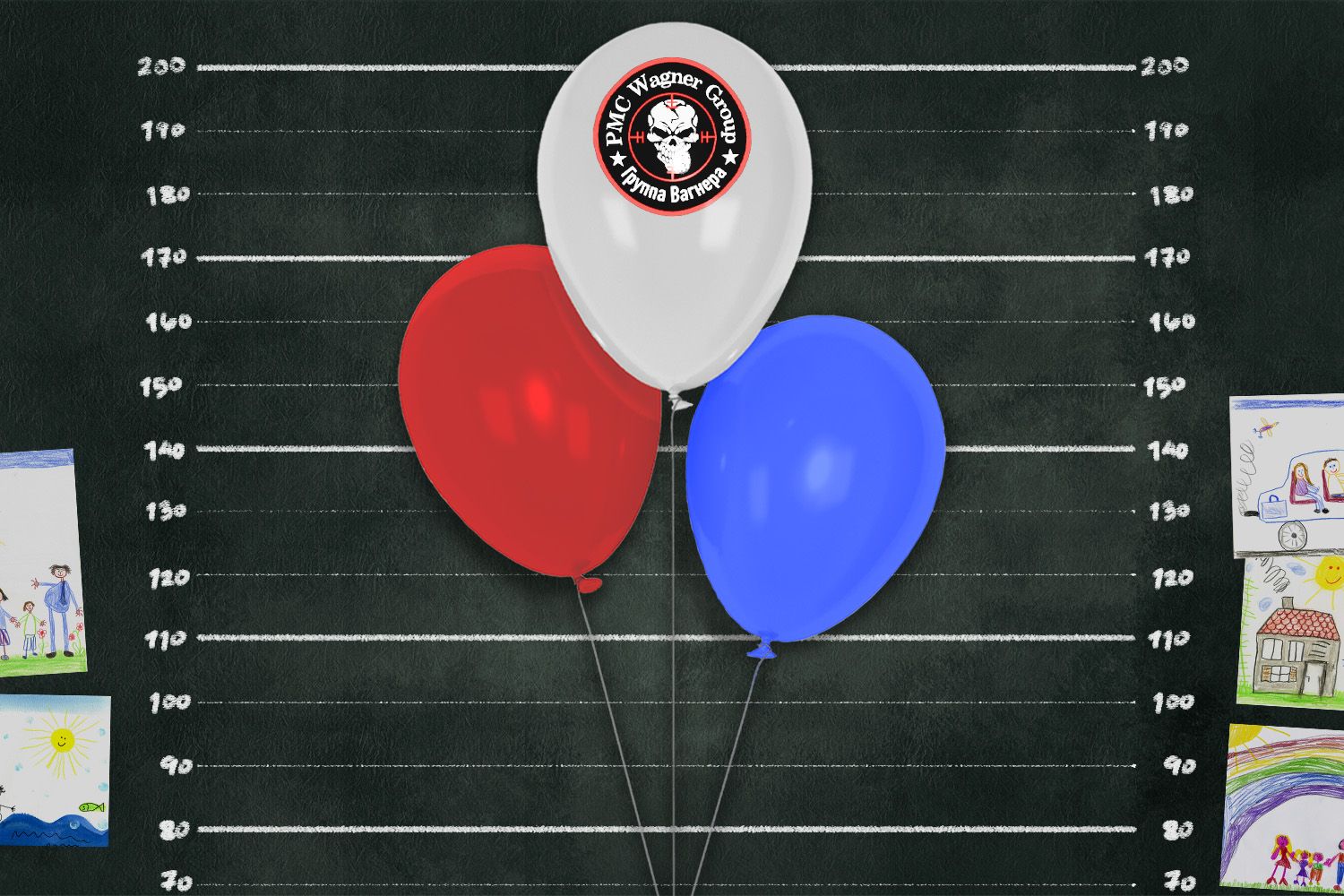On Sept. 2, the first day of school in St. Petersburg, two men in military fatigues stood before a classroom full of children.
“This is a unique moment,” the teacher told the elementary schoolers. “Not everyone has the chance to meet true contemporary heroes of the Russian Federation.”
One of the men, standing tall in dark sunglasses, was Sergey Spitsyn, a former gang leader, convicted murderer and veteran of the war in Ukraine. He stood beneath a cluster of balloons in white, blue and red, the colors of the Russian flag.
“Our grandfathers gave their lives fighting against fascism,” he told them, referring to the Soviet victory in World War II. The children, some with the customary gifts of flowers for their teachers at the start of the new school year, sat at their desks, listening attentively.
“Now, the situation is similar — your fathers and grandfathers are fighting fascism,” Spitsyn continued, echoing the Kremlin’s propaganda narrative that frames Russia’s invasion of Ukraine as a defensive war against a “fascist” regime in Kyiv. Spitsyn is one of about 50,000 convicts who fought in Ukraine under “Project K,” a recruiting campaign aimed at bolstering Russia’s war effort run by the Wagner private military company over a seven-month period in late 2022 and early 2023. In exchange for a six-month contract on the battlefield, convicts were promised higher-than-average military salaries and pardoned by President Vladimir Putin.
About 1 in 3 prisoners didn’t make it out alive, according to an investigation by BBC News Russian and independent outlet Mediazona. Of those who returned to society, some reverted to their violent ways; over the past year, 190 criminal cases have been opened against pardoned Wagner mercenaries, according to data from independent news site Verstka. One of those was Tsyren-Dorzhi Tsyrenzhapov, a convicted murderer who fought in Ukraine, returned and killed a 22-year-old woman. (He was handed a new prison sentence of 14 years.)
But others became everyday heroes, welcomed back with open arms and even celebrated by their country, where absolute loyalty to the motherland is praised as the highest value. At this stage in Putin’s militarized rule, even the most heinous of crimes are forgiven in exchange for duty. (Similarly, in July, in desperate need of troops on its front lines, Ukraine began recruiting from prisons, with inmates being offered parole in exchange for defending “the motherland.”)
Drug trafficker Dmitry Karavaichik was among the first group of Wagner fighters to receive a pardon, in January of last year. The 39-year-old shot to fame six years ago when he and his wife, Diana Gribovskaya, were arrested for the large-scale production and sale of amphetamines. Both were handed lengthy prison terms upon conviction. His specialized knowledge of chemistry earned him the moniker the “Russian Walter White” in the Russian press, a reference to the popular American TV series “Breaking Bad.” Gribovskaya, a physics teacher, handled the distribution.
The couple denied the charges, claiming they were not selling actual drugs but instead deceiving customers with a medicinal mixture of pills that they turned into powder with a coffee grinder.
“It was about usual greed,” Karavaichik said, explaining his motives. “I thought, why not sell this crap and make money?” he told New Lines in an interview in St. Petersburg.
When Wagner recruiters came to his penal colony three years into his sentence, Karavaichik didn’t think twice and immediately signed up: “No one is ready to be in prison. You start breaking, dying slowly inside,” he said in a low, gruff voice.
He was sent to Bakhmut — the site of one of the bloodiest battles in Ukraine to date — and returned home victorious. He said he was then awarded Russia’s highest military honor, the “Hero of Russia” medal, after his group of four men took over a fortified position defended by overwhelming enemy forces.
“We took them by surprise and started working. They were in shock; some of them were asleep,” remembered Karavaichik, who was shot three times during that mission.
Shortly after his release, Karavaichik approached the late Wagner boss Yevgeny Prigozhin with a request: He wanted to trade his “Hero of Russia” star in exchange for the release of his wife, who was still in prison.
“Let’s see what I can do,” Prigozhin told him.
A few weeks later, Gribovskaya recalls receiving the visit of an “enigmatic man” who told her she should prepare to leave the prison. A few weeks later she was pardoned. “He handled everything himself — he went directly to Vladimir Vladimirovich [Putin],” said Karavaichik of Prigozhin. “I owe him a lot and am deeply grateful.”
These days, Karavaichik and Gribovskaya are followed around by a cameraperson making a state-supported documentary about their enduring love story. In the opening scene of “A Hero of Our Time,” a nod to the 19th-century novel by Russian writer Mikhail Lermontov, Karavaichik is shown chatting with former inmates, who ask him about his new life and his pardon. Gribovskaya recently gave birth to the couple’s first child, a boy whom they have named Vladimir in honor of the president.

Spitsyn, who is 52, came of age in Ulyanovsk, a city on the Volga River most famous for being the birthplace of Vladimir Lenin. In the early 1990s, a time of severe economic and social turmoil in Russia, Spitsyn led an eight-person criminal gang that specialized in armed robberies and contract killing.
“Surviving in the ’90s was very tough,” he recalled. “I had a child, a wife and a mother. We needed to eat.”
In 1996, he was arrested and convicted of multiple murders and robberies. After serving about 15 years, he was released and tried to live lawfully for some time. But he soon fell in love with a young woman from the Russian Republic of Tatarstan and returned to crime.
“For young and beautiful girls, you need a lot of money,” he told me.
His final criminal act — kidnapping and cold-bloodedly murdering a man in a forest in 2013 — led to a 22-year prison sentence.
Spitsyn vividly recalls the day that Prigozhin, who was Putin’s close associate and leader of the then-shadowy mercenary Wagner group, began recruiting prisoners from his jail, in October 2022.
“A large helicopter made a big turn over the penal colony and then landed,” Spitsyn recalled. Putin’s former chef-turned-warlord strode into the prison’s main yard, where the convicts were gathered, and made them an offer: fight in Ukraine in exchange for freedom.
It was apparent that Russia’s full-scale invasion of Ukraine was not going as planned and was nowhere near the blitzkrieg the Kremlin was banking on. Bogged down in a prolonged conflict for which the Russian army was unprepared, the Kremlin allowed Prigozhin to recruit men from prisons.
Prigozhin, who had himself served a 10-year sentence for robbery, understood the prison world intimately and spoke to the convicts in their own language. “He didn’t hide anything — he told us immediately he needed storm troopers that will head into slaughter, that it will be tough,” Spitsyn recounted.
Prigozhin specifically targeted those convicted of violent crimes like murderers and robbers — men unafraid to kill and with little to lose.
Spitsyn was living comfortably behind bars, enjoying the privileges of his rank in the criminal hierarchy.
“I had about six people helping me live,” he said. “When I woke up in the morning, one guy would make tea for me, do my laundry.”
It was mainly patriotism, he said, that motivated him to take Prigozhin’s offer.
“Even if they had asked me to fight and then return to prison, I would have gone anyway,” Spitsyn said. “For my motherland, I would tear anyone apart.”
After some short military training, convicts were sent to the outskirts of Bakhmut, which at the time was the hottest area of the front line.
Spitsyn was assigned to the “Ambrella” team, which included recruits affected by HIV, syphilis and other diseases that can be transmitted through blood transfusions. He was marked with a white bracelet, signaling he had hepatitis C, which he believes he contracted from an unprotected encounter with a sex worker years earlier.
The Ambrella recruits were known for being the most expendable among convicts, always sent in first during suicidal assaults.
Spitsyn vividly recalls his first combat mission. His unit was tasked with seizing control of a gas station on the outskirts of Bakhmut, passing through a tree line to avoid sniper fire.
Prisoners were sent forward in waves of 15, under constant Ukrainian shelling and drone strikes. Explosions and shrapnel filled the air.
“That was really terrifying,” he said.
As Spitsyn neared the gas station, he bumped into mutilated soldiers who had gone ahead of him and were being evacuated. In the end, he found himself crawling, using as cover the body of a fallen comrade with whom he had shared tea that morning.
“As I was getting closer and closer, I was talking to him: ‘Sorry, Tyoma, buddy, but you’re already dead,’” Spitsyn said.
Resourcefulness and unconventional thinking were the traits that set the convicts apart from regular soldiers according to Spitsyn. “You learn to find shortcuts, to not just follow the straight path like everyone else,” he explained.
What also set Wagner apart from the regular Russian army was its harsh discipline, which included summary executions for desertion, the abuse of drugs and alcohol or sexual contacts with local civilians.
Spitsyn recounts taking part in the execution of a group of soldiers who had gotten drunk instead of guarding their positions. “They weren’t soldiers; they were all convicted criminals. If you are too lenient toward these people, you’ll lose control.”
Former convicts recruited through Project K bore the brunt of the six-monthslong battle of Bakhmut, which ended with Russian forces capturing the city: Roughly 88% of about 20,000 Wagner mercenaries who died in the bloody battle were former prisoners, according to the investigation by the BBC and Mediazona.
Only 17 of the original 162 men in Spitsyn’s Ambrella group were alive by the end of the six-month contract.
Some analysts say the sacrifice paid off strategically for Russia: Defending Bakhmut to the last man forced Ukraine to commit some of its best units, thus diverting resources from the counteroffensive that later failed in the summer of 2023.
Wagner’s Project K was shut down in February 2023, when the Russian Ministry of Defense took over the prisoner recruitment, which continues up to this day.
This shift marked the beginning of a bitter conflict between Prigozhin and Russia’s military leadership, culminating in the Wagner armed rebellion in late June 2023, when Wagner troops seized control of the Russian military headquarters in Rostov-on-Don while an armored column advanced toward Moscow.
Later that day, Prigozhin ordered the troops to stand down in order to avoid bloodshed.
Many former mercenaries, including Karavaichik and Spitsyn, supported Prigozhin in what they called the “March of Justice,” aiming to combat systemic corruption within the Ministry of Defense.
“We intervened to support the president of the Russian Federation because there was a mess in the Ministry of Defense,” Karavaichik explained. “One year later, it’s evident we were right — billions are being stolen,” he argued, referencing recent high-profile corruption cases and arrests within the Russian military.
The failed uprising led to the overhaul of Wagner, whose members now are mostly serving within the Ministry of Defense. A month later, Prigozhin and other Wagner leaders died in a plane crash, the circumstances of which remain unexplained but which is largely believed to have been an intentional move by the Russian leadership.

On a sunny morning in late August, dozens of Wagner fighters gathered at a makeshift memorial on the outskirts of St. Petersburg. They came to honor the memory of Prigozhin and his right-hand man, Dmitry Utkin, on the anniversary of their deaths.
“They created us — this organization, one of the world’s strongest armies,” Spitsyn said, addressing the small crowd. “Glory to Russia! Glory to Wagner!”
“He was like a father to us; he gave us a chance at life,” echoed Karavaichik, clad in a black uniform with war medals on his chest.
After completing a second contract with Wagner, Karavaichik has come back to civilian life and now runs a number of military-related businesses, including the production of prosthetics and sleeping bags.
He also collaborates with a St. Petersburg-based governmental fund that supports soldiers fighting in Ukraine.
Spitsyn works at the city’s main train station, where he provides support to passengers with reduced mobility. He admits that his salary barely covers his family’s needs but finds his work fulfilling.
“I like helping people,” he said. “When 30 people thank you from the bottom of their hearts every day, no amount of money can compare.”
Like other veterans of the war in Ukraine, Karavaichik and Spitsyn are frequently invited to speak at schools, sharing their life experiences with students.
The temptation to go back to the front line remains strong for both men. “I see what’s happening in the Kursk region and feel the pull to go, but my family holds me back. I don’t know how it will end, whether I’ll stay here or go to war,” Spitsyn confessed.
“It’s like a magnet, drawing you in, like a drug for an addict,” agreed Karavaichik, who is also contemplating signing another military contract. “Life there is interesting and very simple,” he said, describing the war in Ukraine. “It’s black and white, we and them.”
The former convicts say crime no longer attracts them. Spitsyn, reflecting on his past wrongdoings, expressed no regrets.
“What’s done is done. What’s the point in regretting? Life goes on,” he said. “Those were different times and circumstances, but when it comes to the motherland, one’s country — that’s an entirely different matter.”
Become a member today to receive access to all our paywalled essays and the best of New Lines delivered to your inbox through our newsletters.



